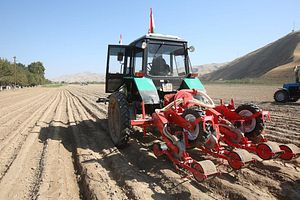According to a World Bank project — Listening2Tajikistan — which surveys households in the country, monetary welfare in Tajikistan has improved slowly in 2016. The survey project launched last year and is thus able to benchmark 2016’s results to date against data from 2015. With only two years to compare, there are only so many conclusions which can be drawn but the patterns are nonetheless interesting.
What the World Bank called an improvement in “monetary welfare” was driven in the May-August 2016 period by growth in per capita wage income and higher per capital income from agriculture and self-employment. Per capita wage income grew by 18.1 percent over 2015 and income from agriculture and self-employment by 5.3 percent. There was also an increase in the average value of remittance transfers, 5.5 percent.
On remittances, the situation is complicated by the diverging fates of those in the bottom 40 percent of the consumption distribution and those in the top 60 percent. According to the survey results, income from remittances in the bottom 40 percent households fell by 9 percent in the May to August 2016 period in comparison to the same period in 2015. Top 60 percent households, however, saw their income from remittances grew by 16.3 percent.
The World Bank cites official data as indicating that the value of remittances in the first half of 2016 were 22 percent lower than in 2015 in nominal USD term. But, “when remittances are instead reported in real Somoni terms (which is more directly relevant for measuring welfare in Tajikistan), official data indicate that remittances began recovering slightly in the first half of 2016 (by about 2.4 percent over the same period the year before).”
In other areas changes were slight or nonexistent: the ratio of migrants returning fell slightly from 1.9 percent in May-August 2015 to 1.6 percent in the same period in 2016; the average percent of household members working rose slightly from 18.6 to 20 percent; the number of households reporting electricity outages in the past 10 days when surveyed remained at about 48 percent and the number of household reporting water disruptions in the previous 10 days rose slighty from 20 to 23 percent.
While survey projects like this are valuable to gauge a population’s perceived well-being and to measure changes over time — they only grow in value as time progresses. When the survey began in May 2015, the combination of factors — fallen oil and commodities prices and sanctions — had already begun to impact the Russian economy. What ails the Russian economy, trickles into Tajikistan due to the high number of Tajik migrant workers in Russia. Improvements in the survey are relative.
Moreover, even the relative improvements still nonetheless depict a nation gripped by poverty. Perhaps, as the World Bank says, “Tajikistan’s pace of poverty reduction over the past 15 years has been among the top 10 percent in the world.” But the country was starting from a low base and many Tajiks remain unable to provide for their basic needs. The survey included questions about being able to buy enough food, pay for utilities and pay for housing. In the May-August 2016 period households reporting they were able to buy enough food rose 5 percent, those able to pay for utilities fell 6 percent, and those able to pay for housing fell 7 percent. The change from last year is similar, with the averages in the May-August period for households reporting being able to buy enough food rising between 2015 and 2016 by 10 percent while those being able to pay for utilities and housing fell by 4.75 and 1.5 percent respectively.
Economic well-being is not a simple measurement and while the Listening2Tajikistan project provides a valuable dataset, more information is needed over a longer period of time. In addition, such surveys produce data but not always explanations for the changes observed.

































